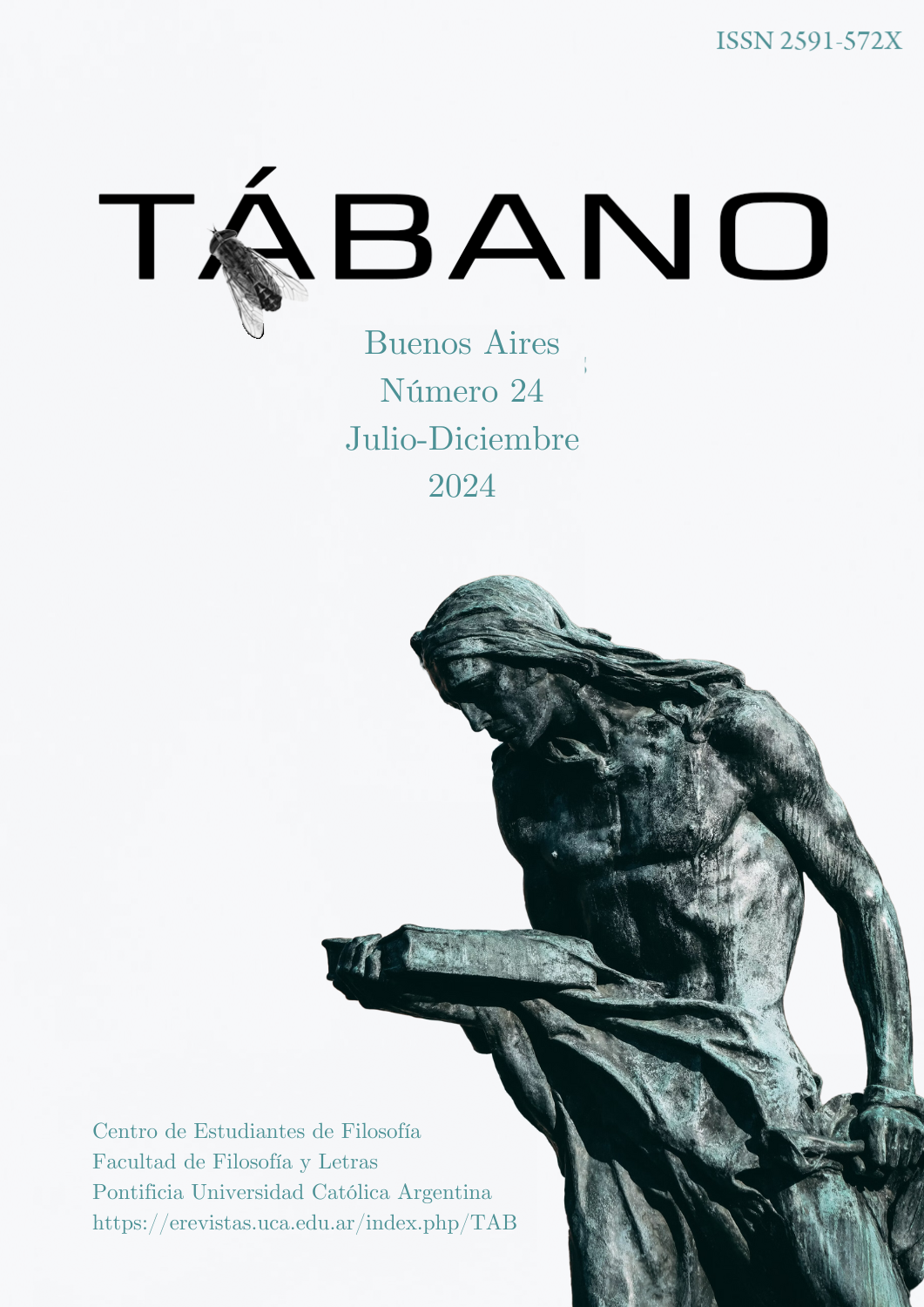Merleau-Ponty contra el proyecto de una gramática universal: lógica y lenguaje
DOI:
https://doi.org/10.46553/tab.24.2024.p60-80Palabras clave:
Merleau-Ponty, Gram´ática universal, Lenguaje, LógicaResumen
A lo largo de una serie de textos, Merleau-Ponty criticó el proyecto husserliano que alternativamente denominó “gramática universal” y “eidética del lenguaje”, y al cual asoció una serie de consecuencias: la tesis de que la gramática universal implica (I) la previa cognoscibilidad de las “formas” universales con respecto a los lenguajes naturales; (II) la univocidad con la que las palabras en los lenguajes naturales se vincularían con sus significados, y la transparencia con que esta relación unívoca se presentaría ante la conciencia, (III) la secundariedad del lenguaje con respecto al pensamiento y (IV) la intertraducibilidad universal. El autor francés rechaza estas consecuencias y por tanto cuestiona la plausibilidad del proyecto universalista en cuestión. sin embargo, no es claro que estas presuntas consecuencias estén realmente implicadas por la propuesta que Merleau-Ponty está discutiendo ni que, de obtenerse, tengan la forma específica necesaria para que la crítica tenga éxito. Trataremos de mostrar que tal crítica en última instancia falla.
Descargas
Citas
Edie, J. (1970a). Can Grammar Be Thought? In J. Edie, F. H. Parker, & C. O. Schrag (Eds.), Patterns of the Life-World: Essays in Honor of John Wild. Northwestern University Press. http://gen.lib.rus.ec/book/index.php?md5=59A6873D0F4FFDDD99F10528CAEDC5D4
Edie, J. (1970b). The Levels and Objectivity of Meaning. In R. Wood (Ed.), The Future of metaphysics. Chicago, Quadrangle Books. http://archive.org/details/futureofmetaphys0000unse
Edie, J. (1976). Speaking and meaning: The phenomenology of language. Bloomington : Indiana University Press. http://archive.org/details/speakingmeaningp0000edie
Edie, J. (1987). Merleau-Ponty’s philosophy of language: Structuralism and dialectics. https://philpapers.org/rec/EDIMPO
Escribano, X. (2000). Gesto y palabra: La esencia emocional del lenguaje según Maurice Merleau-Ponty. Thémata: Revista de filosofía, 25, 175–185.
Foultier, A. P. (2013). Merleau-Ponty’s Encounter with Saussure’s Linguistics: Misreading, Reinterpretation or Prolongation? Chiasmi International, 15, 129–150. https://doi.org/10.5840/chiasmi20131514
Haysom, K. (2009). Communicating Depth: Habermas and Merleau-Ponty on Language and Praxis. Political Theory, 37(5), 649–675. https://doi.org/10.1177/0090591709340136
Husserl, E. (1913). Logische Untersuchungen Bd. II. Max Niemeyer.
Kee, H. (2018). Phenomenology and Ontology of Language and Expression: Merleau-Ponty on Speaking and Spoken Speech. Human Studies, 41(3), 415–435. https://doi.org/10.1007/s10746-018-9456-x
Kwant, R. C. (1963). The Phenomenological Philosophy of Merleau-Ponty (First Edition). Duquesne University Press.
Landes, D. (2013). Merleau-Ponty and the paradoxes of expression.
Lewis, P. E. (1966). Merleau-Ponty and the Phenomenology of Language. Yale French Studies, 36/37, 19. https://doi.org/10.2307/2930398
Merleau-Ponty, M. (1945). Phénoménologie de la perception. Editions Gallimard.
Merleau-Ponty, M. (1951). Le Philosophe et la Sociologie. Cahiers Internationaux de Sociologie, 10, 50–69. JSTOR.
Merleau-Ponty, M. (1964a). Phenomenology and the Sciences of Man. In J. M. Edie (Ed.), The Primacy of Perception. Evanston, USA: Northwestern University Press.
Merleau-Ponty, M. (1964b). Psychosociologie de l’enfant. Bulletin de psychologie, 18(236), 203–225.
Merleau-Ponty, M. (1973). The prose of the world. Northwestern University Press.
Merleau-Ponty, M. (1975). Les Sciences de l’homme et la phénoménologie. Centre de documentation universitaire.
Merleau-Ponty, M. (1978). La prose du monde. (Original work published 1969)
Merleau-Ponty, M. (1978a). On the phenomenology of language. In M. Merleau-Ponty, Signs (6. print). Northwestern Univ. Pr.
Merleau-Ponty, M. (1978b). The philosopher and sociology. In M. Merleau-Ponty, Signs (6. print). Northwestern Univ. Pr.
Merleau-Ponty, M. (2002). Phenomenology of Perception. Taylor & Francis.
Merleau-Ponty, M. (2020). Le problème de la parole: Cours au collège de France. Notes, 1953-1954 (1er édition). Métis Presses.
Priest, S. (1998). Merleau-Ponty. Routledge. http://public.eblib.com/choice/publicfullrecord.aspx?p=166627
Roux, J.-M. (2016). Forme du perçu, structure du langage: Merleau-Ponty avec et contre Saussure. Bulletin d’Analyse Phénoménologique. https://doi.org/10.25518/1782-2041.822
Vendryes, J. (1921). Le langage: Introduction linguistique à l’histoire. Paris : Renaissance du livre.
Yahata, K. (2012). La problématique de l’expression dans la philosophie de Maurice Merleau-Ponty.
Descargas
Publicado
Cómo citar
Número
Sección
Licencia
Derechos de autor 2024 Claudio Cormick

Esta obra está bajo una licencia internacional Creative Commons Atribución-NoComercial-CompartirIgual 4.0.



